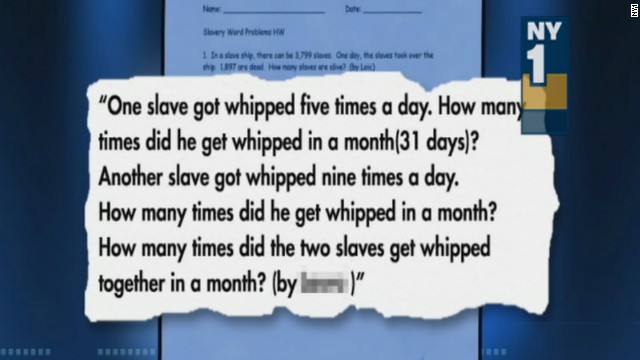
(CNN) — A math homework assignment that asked fourth grade students to tally the number of slaves on a ship has sparked outrage among parents and administrators in Manhattan. The assignment was devised by another group of students, after they apparently expressed interest in the transatlantic slave trade. It required fourth graders to calculate the remainder of those not killed by a mutiny aboard the vessel, and to determine the number of times slaves were beaten in one month.
“This is really inappropriate,” student teacher Aziza Harding told CNN affiliate NY1 on Friday. “It should not be a homework assignment, and I did not want to make copies of this.” Harding was asked to photocopy the assignment by another teacher, but refused because the questions made her uncomfortable and she thought it desensitized students to the horrors of slavery. The first question read: “In a slave ship, there are 3,799 slaves. One day, the slaves took over the ship. 1,897 slaves are dead. How many slaves are alive?” The second question read: “One slave got whipped five times a day. How many times did he get whipped in a month (31 days)? Another slave got whipped nine times a day. How many times did he get whipped in a month? How many times did the two slaves get whipped together in one month?”
The worksheet was created earlier this year by another teacher whose students were studying the history of slavery in their social studies class. During a math lesson, they were asked to create word problems on the same topic. Another teacher borrowed the worksheet before leaving for vacation, according to a statement by New York school officials.
“This is obviously unacceptable and we will take appropriate disciplinary action against these teachers,” said Connie Pankratz, a spokesperson for the NYC Department of Education. “The chancellor spoke to the principal, and she has already taken steps to ensure this does not happen again.” Adele Schroeter, the school principal, said she was appalled and will be meeting with staff as well as families. “I have already met with the teacher and have arranged for training around this issue for the entire staff at my school,” she said in a statement. Harding said that instead of students getting desensitized to this type of violence, she wanted them to “have a general idea that wow, this is a terrible thing that happened to a group of people for over 300 years.”
Harding, a graduate student at New York University, contacted her professor about the incident, then reached out to NY1. The professor, Charlton McIlwain, who teaches Media, Culture, and Communication, said, “When she first explained what had happened to me, I was in disbelief. I said, ‘I don’t believe you, send me a copy.’ ” He said he understood that teachers were trying to integrate subject matter, but felt the math questions did not provide enough context for the students. “It completely trivializes the historical significance, pain and violence of slavery. By extracting that experience into math problems, students role play being slave traders. It’s part of a much larger story and you can’t get that in a math assignment,” McIlwain said.
This comes after a string of similar incidents in schools across the country last year. In January 2012, a Georgia elementary teacher came under fire after using slavery references in math problems assigned to 8-year olds. In March, a teacher in Washington was fired after she assigned math problem asking students to calculate how many Africans, Americans and Indians to bake in ovens for Thanksgiving. In October, a Wisconsin teacher drew criticism for assigning math homework that used a derogatory Native American term for women.
The math worksheet has drawn reaction from the school and the surrounding community, including a New York state senator calling for the immediate removal of the two teachers who assigned the homework. McIlwain said he does not think firing the teachers is the answer. “It would be better to have these teachers go through some kind of productive discipline where they can talk with parents, with students, with the community, about why this is offensive and why the topic is important,” said McIlwain. “I hope the dialogue will continue.”











